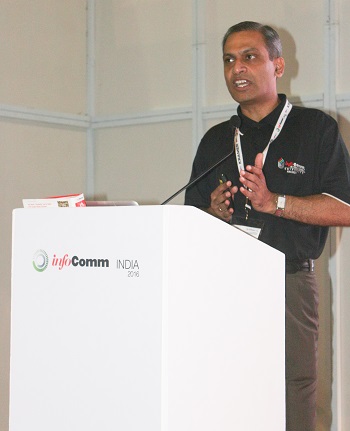Teaching CTS Prep Across India and the Middle East
 AVIXA instructor T S Gopalakrishnan, CTS-I, CTS-D, has taught a dozen CTS Prep courses across India and the Middle East in the past two years to guide numerous students on their journey to becoming a Certified Technology Specialist.
AVIXA instructor T S Gopalakrishnan, CTS-I, CTS-D, has taught a dozen CTS Prep courses across India and the Middle East in the past two years to guide numerous students on their journey to becoming a Certified Technology Specialist.
A 21-year industry veteran, Gopalakrishnan is currently an AV consultant with DynaMix Media in Delhi. In this Q&A, he talks about the CTS Prep course and the value of certification for AV companies and practitioners.
Q: Since becoming an AVIXA instructor, have you seen a rise in the demand for training and certification?
Gopalakrishnan: Yes. There are now more than 100 CTS-certified professionals in India alone. This has to do with the end-user community starting to demand staff certification for pre-qualifying implementation vendors. This is especially true when we’re talking about world-class projects.
For evidence, look no further than the Indian government initiatives like Digital India and Smart Cities projects or those in the Middle East like 2022 FIFA World Cup in Doha and Expo 2020 in Dubai. It is very important for companies in the region to prioritize their staff training and certification to stay competitive.
Q: How does the CTS Prep class help prepare students for the test?
Gopalakrishnan: The class spells out what students need to know to get certified. They also get insiders’ tips for all kinds of learning resources many don’t know about.
But in my opinion, what’s most valuable is the activity-based learning, such as the AV math breakout sessions. I have seen the power of this highly engaging form of learning—both as a student years ago and now as an instructor. This allows students to collaborate with one another on solving problems that are very relevant to most AV tasks.
Q: Beyond preparing for the test, how do students benefit from attending the class?
Gopalakrishnan: Many students come from very different background, so when the students talk with one another in the learning sessions, the class itself naturally serves as a forum for exchanging views and experiences. Students often learn something from each other they find themselves applying in their work.
Also, as they learn the standards and best practices, they quickly understand why they should be an integral part of the solutions for clients.
Q: How do students know when they are ready to take the CTS test?
Gopalakrishnan: The hardest part is deciding to actually take the test. Many students in this region tend to think of CTS as a test only designed for highly technical people—those with a degree in engineering, for example. And because of this, they always assume that they are unprepared. In my experience, most test-takers who come to CTS Prep pass in their first attempt.
I always encourage students to schedule their test as soon as they start preparing for it. We all know that once you are in your work routine, the actual test-taking takes a back seat. And even if you do fail the first time, you quickly find out the areas you need to work on for the next test.
Q: What is your favorite part about being an instructor?
Gopalakrishnan: I get to be a student and instructor at the same time! I learn tremendously from the students just by listening to their challenges in their projects and how they tackle them.
Q: You received your first CTS certification almost four years ago. What role has the CTS credential played in your career so far?
Gopalakrishnan: I have been in systems integration and now consulting and project managing AV for conferences and live events. I can confidently say certification provides a valuable endorsement for your AV capabilities. Regardless of where you go, you get a higher level of respect from clients, coworkers, and competitors alike.





